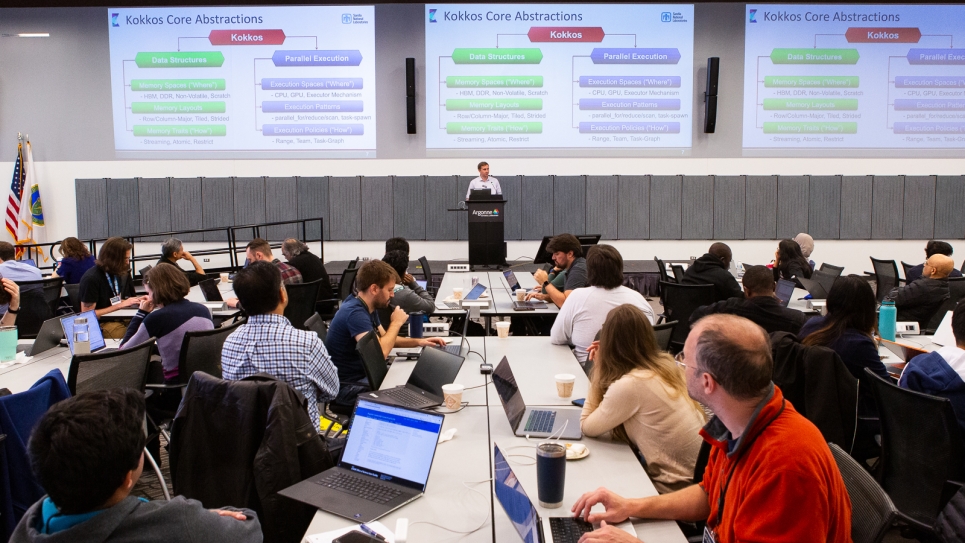
ALCF’s Brian Homerding gives a talk on programming models at the 2023 ALCF Hands-on HPC Workshop.
The ALCF hosted its annual hands-on workshop to help attendees improve code performance and advance application development on ALCF systems.
The Argonne Leadership Computing Facility (ALCF), a U.S. Department of Energy (DOE) Office of Science user facility at DOE’s Argonne National Laboratory, recently hosted an in-person workshop to provide researchers with hands-on training using the facility’s high performance computing (HPC) and artificial intelligence (AI) resources for science and engineering projects.
This fall, the ALCF Hands-on HPC workshop welcomed more than 100 attendees for an opportunity to work directly with ALCF and HPC industry staff to learn tools, techniques and best practices for improving the productivity and performance of their HPC- and AI-driven research campaigns. The three-day event included dedicated hands-on sessions that allowed researchers to focus on porting their applications to heterogeneous architectures and improving their code performance on the Polaris supercomputer and the ALCF AI Testbed systems. Attendees also got to hear from researchers preparing applications for the ALCF’s Aurora exascale supercomputer and take part in a tour of Argonne facilities, including Aurora, the ALCF Visualization Lab and the Rapid Prototyping Lab.
“It is vital for us to create these opportunities in which researchers can work directly with ALCF staff and industry experts,” says Paige Kinsley, ALCF Education Outreach Lead. “It is this direct hands-on experience that helps us share ALCF tools and knowledge to drive innovation and build lasting relationships in the research community.”
While the workshop was attended by several existing users, it also brought in some new researchers interested in learning how ALCF resources could propel their research in the future.
Ishan Buyyanapragada, a senior at the Illinois Math and Science Academy, was connected to the ALCF through a STEM program offered at his high school. After working with an Argonne mentor on a biomedical study that used ALCF AI Testbed systems, he attended the workshop to learn how he could further his research involving natural language processing.
“I’d say the workshop was designed perfectly for people who were not only looking for a broad understanding of HPC, but also people who knew exactly what they wanted to do with their research and as a result were able to hone in on it,” Buyyanapragada says.
Hae Kyung Im, an associate professor of medicine at the University of Chicago, attended the event to work with ALCF staff to improve her team’s use of deep learning methods on Argonne computing resources. She and her team members, Saideep Gona and Temidayo Adeluwa, are part of an ALCF Director's Discretionary project that is using Polaris to predict protein binding and study different biological traits linked to diseases.
For Gona, the workshop allowed him to gain a better understanding of I/O and storage on HPC systems, as well as how to do more scalable training of deep learning models for analyzing DNA sequences and predicting molecular phenotypes. He also learned how ezpz, a library for simplifying the process of setting up distributed training, could help enhance their work at the ALCF.
“We have technical challenges in our research and the best way to resolve them is to learn about Argonne’s HPC systems directly from the source,” says Gona. “It was really cool to get a sneak peek at ezpz, which ALCF’s Sam Foreman has been developing, because it is a solution to a problem that could remove a lot of headaches on our end as researchers and allow us to focus more on the science.”
Adeluwa, who is also exploring how to use deep learning models for molecular phenotype prediction, notes that ALCF systems have been crucial in their work to train the models and run very large computing jobs. He valued the workshop’s hands-on sessions with ALCF staff and the opportunity to engage and network with fellow ALCF users.
“I really appreciated meeting people from other fields, and as a result, I made new friends and connections,” says Adeluwa. “Because of this workshop, I now have a new strategy to manage the huge number of files we generate when we run our models.”